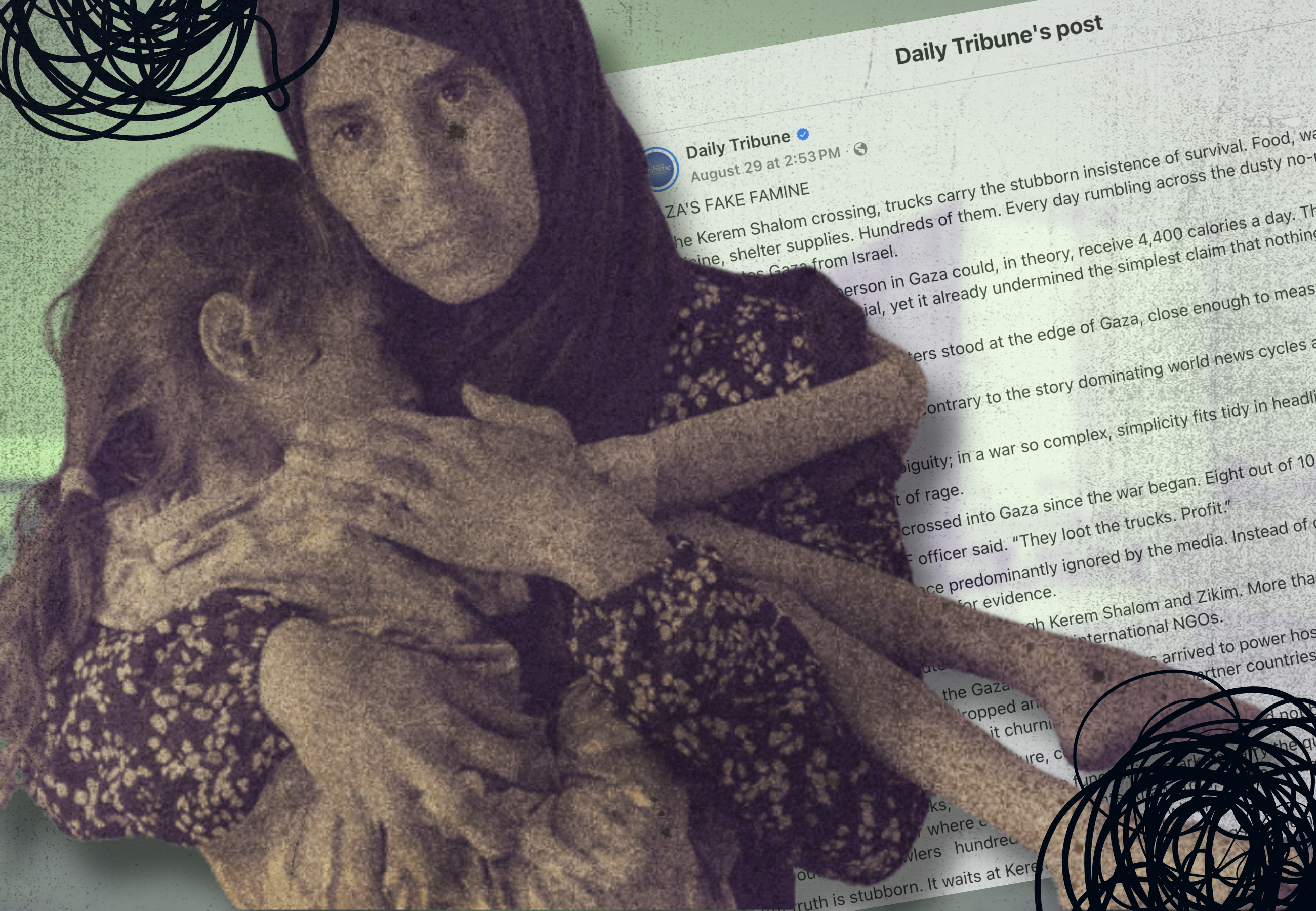Daily Tribune calls Gaza’s food scarcity a ‘fake famine’

JEERS TO Daily Tribune for claiming a “fake famine” in Gaza, contradicting confirmation by the United Nations and food security experts that people are suffering from food deprivation in the Palestinian area.
In an August 29 Facebook report, Vernon Velasco, a reporter from Daily Tribune, dubbed the food deprivation of Gaza citizens as a “fake famine.” Velasco described witnessing trucks filled with survival resources arrive at the Kerem Shalom crossing when he traveled to the area on a trip organized by the Embassy of Israel in Manila. He wrote, “The evidence we could witness was partial, yet it already undermined the simplest claim that nothing was reaching Gaza.” His statement implied that media reports about the failure of delivering supplies to the people of Gaza were false.
According to the UN, it was evident that since July this year, food and aid supplies were arriving in Gaza, “insufficient, inconsistent, and inaccessible.”
Velasco’s report relied on an unidentified Israel Defense Forces officer as his source, who claimed that Hamas diverts aid by looting the trucks to “profit.” The piece also amplified the view of a single military source, disregarding the claims of a number of international humanitarian bodies.
In August, the aid agencies also repeated several warnings of a massive famine that could potentially occur in the Strip, citing Israeli blockade as a reason. About 500,000 people were in the worst situation, with another 160,000 expected to be added in the coming weeks.
Before the release of Velasco’s report, UN had confirmed the famine in Gaza on August 22, which was backed by food security experts, Food and Agriculture Organization of the United Nations (FAO), UNICEF, the United Nations World Food Programme (WFP) and the World Health Organization (WHO).
A more significant sign of famine was the alarming increase in hunger-related deaths and malnutrition among children.
The case has raised serious concerns about bias and accuracy in reporting conditions in the area of conflict. With conflicting reports supplied by sources on opposing sides of the conflict, journalists should seek international groups and organizations working in the area of conflict which have proven their objectivity when describing the humanitarian conditions in the Gaza area.
Velasco was among the sixteen Filipino journalists invited by the Embassy of Israel in Manila to travel to the area on August 13. According to the Embassy, the aim of the week-long press junket was to “uncover(ing) stories that go beyond the headlines.”
The condition alone signals the danger of compromising one’s reports, which should alert journalists to presume that they would be given a selective view, and thus, must seek other sources who would check the veracity of their reports. To accept the limited view provided by the Israeli sponsors is to lend their credibility to a partisan agenda.
To present without question the limited views of the reality in Gaza is to sow doubt and disbelief about the food crisis emerging in Gaza.
A spare coverage
Mainstream media have evidently fallen short in placing Gaza’s ongoing conflict and its humanitarian toll on the news agenda. Coverage is mostly evident in the Philippines’ occasional airing of its diplomatic stance on the Israeli-Palestinian conflict.
This selective coverage sidelines one of the world’s most pressing humanitarian crises. The media’s scattered reporting and dependence on wires rather than sustained updates can create false impression about the crisis in Gaza and reduce the urgency of a humanitarian action to aid the afflicted civilian population.
On September 16, the UN investigators tagged Israel’s actions as “committing genocide” to “destroy the Palestinians” in Gaza. Journalists who are provided the opportunity to travel to the area must take care not to base their reports on curated tours which must be presumed to select what journalists are shown. Journalists must ensure that their reports do not contribute to disinformation campaigns employed by interested parties. The victims of war do not deserve such easy betrayal.
Leave a Reply